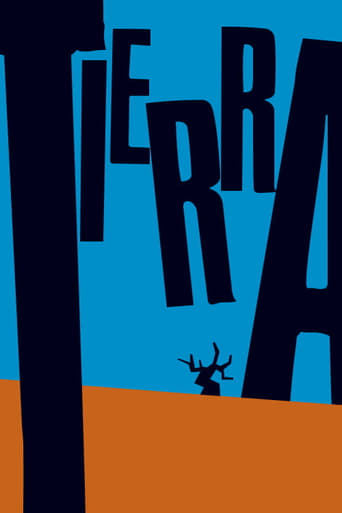alice liddell
If you tell a story through a certain protagonist's mind, your film is going to take on the qualities of that mind. Medem's typically ambiguous TIERRA, is one of the masterpieces of 90s cinema, and has not so much an open ending as an open beginning and in-between as well. Its hero is either deranged or a heavenly spirit, and, seen through his eyes, the world, and the film, take on an otherworldly strangeness.As with all Medem's films, TIERRA operates on two levels of meaning - the surface narrative, and the underlying composition of image and form. Both levels interact much more fluidly, though, here, creating a work that always seems to make enough sense, and yet, when you think about it, only increases in bewildering enigma. The film starts with a voiceover talking to someone called Angel through the cosmos, informing him of the job he has to do, showing him the island he will be working on, and warning him of the mysteries riddled therein.Angel turns out to be an insect fumigator, come to destroy the woodlice that are infesting the island's vineyards. On the way he comes across gypsies minding sheep, and the shepherd who was struck down by lightening, momentarily resuscitated by another volt before dying again. Angel hires the gypsies, and visits the first farmer, Tomas, in mourning for his recently deceased wife. He has a daughter, Angela, with whom he falls in love. Angel later befriends her husband, Patricio, who nearly kills him while out shooting the equally pestilant wild boars, but they come into conflict when Patricio's sex-mad mistress, Mari, shows insatiable interest in Angel.The never resolved crux of the film turns on whether Angel is really an angel, or, as his history of psychiatric care would suggest, a madman. Once we find out that he was once mad, we assume that all his visions and heightenings of reality are the effects of a troubled mind. Angel himself yearns for simplicity and unity, but is constantly being torn apart. Despite the vast expansiveness of the land he finds himself in, he is continually hemmed in, by repetition, patterns. The woman he loves, and her daughter share his name, the latter's teacher has that of her husband.
He has a constant feeling of deja vu though he denies ever having been in the place before, even if it's some coincidence that his psychiatric warden should have a new job here. Events throughout the film repeat and turn in on themselves - the bug fumigation and boar-hunt, each evincing different levels of Angel's control. His persistant attempts to master his environment, his mind, his desires, the universe, are like the preposterously intricate patterning of a mad man. His self literally divides in front of him, he talks to himself.The status of the image in front of us is always unstable - we don't know whether he's imagining it or not. His mental troubles extend to physicality, and the film seems to adopt Bunuel's tactic in THAT OBSCURE OBJECT OF DESIRE, with two different women representing different elements of sexuality open to Angel - quiet, maternal, nurturing on the one hand, and red hot sex on the other.But even this misogynistic dichotomy is complicated - the two women are separate, independent beings in their own right, not 'aspects' of woman; and whereas Fernando Rey was an image of besieged masculine unity, Angel is, as I have mentioned, completely at odds with himself. It is he who becomes Bunuel's woman, he who is split. The women refuse their stereotyped roles - the 'quiet' one is desperate for sex, after years of loveless marriage, as well as warmth and sympathy, while the nympho is trying to find love after years of promiscuity. Angel's troubles extend to his control over his narrative, his switching back and forth between times, spaces and realms; his splitting between narrated and narrating self; his adding new elements and information to past events, playing with both ellipsis and excess of point of view, rendering all information deeply unreliable.
All of this would be quite conclusive proof of madness. Even his facility with the dead could be simply imaginary. But what of his reuniting Tomas with his dead wife - can this JUST be empathy? Ditto the profuse Biblical symbolism and allusionism. What about his transformation of the mere EARTH into an otherworldy planet, with its Martian red surface and spacemen fumigators? Maybe madness is otherworldly, acccessing the madman to plains of insight and experience inaccessible to the ordinary person. This isn't a crass way of saying that the 'mad' are more special than the 'normal' are - maybe we castigate as mad anyone without our tunnel vision. Angel is the director of the film - his formal ordering is the film's - as VACAS suggested, maybe the only way to see anew is to cast off the normal.If I've made TIERRA seem like too much of a riddle than a film than I'm an idiot. Its brilliance lies in, as the title suggests, grounding such wispy concerns. Every character IS a character, with their own sadnesses, failures, lusts and needs - Angel's vision, though repeatedly self-serving, is always empathetic. The film is also wonderfully funny, with one excellent sequence of sex farce, mixed with some blacker, more brutal comedy.One sits in awe at Medem's cinematic mastery, his adept handling of both long shot and extreme close-up, the wider view and the crucial detail. He plays with narrative like it is plastercine, the seemingly solid infinitely pliable, like the earth covered with louses. In a film obsessed with death, he assserts life and the comic spirit, accomodating, not refuting, the abyss. Human beings, like Angel, are too complicated to 'understand' - we must simply accept and enjoy the confusion.



